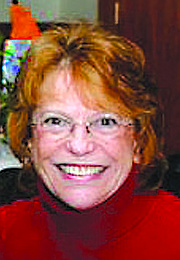Turn New Year’s resolutions into habits
Happy New Year! In the next few days, about half of us will make New Year’s resolutions, but only ten percent of us will actually keep them until Valentine’s Day. Have you ever wondered why? Well, wonder no more. Dr. Charles Herrick, Chair of Psychiatry for Nuvance Health in Connecticut gives us the answer:
“There are many reasons why people may not keep New Year’s resolutions, but instances of New Year’s resolution burnout can be narrowed down to three psychology-related issues: difficulty breaking old habits, focusing on specific outcomes, and problems with purpose.”
He says that meeting goals requires making new habits and breaking the old ones. That’s easier said than done even though one would think that creating a good habit is just as easy as creating a bad one.
Unfortunately there are rewards for bad habits. For instance, take smoking. Nicotine is a drug that makes you feel happy because it stimulates the release of the hormone dopamine. But let’s look beyond the addiction. Look at the habit. Do you light up first thing in the morning? Last thing at night? Have you ever lit up without thinking about it? That’s a habit.
Dr. Herrick advises to focus on the reason for the goal, not the goal itself. For instance, if your New Year’s resolution is to lose twenty pounds don’t think about the number twenty, think about how losing weight will improve your health or how much better your clothes will fit. If you put the emphasis on the twenty pounds, you’re more apt to fall back to bad habits once you achieve that goal. And then you risk gaining the weight back. Got it?
In an article published on the website medium.com, a blogger named Elias Scully says that habits can be created in 21 days. I’m not sure I agree with everything he said, but I do agree with his belief that habit formation is a function of three key criteria: (1) level of commitment; (2) internal and external accountability and (3) size of habit.
“You have to recognize that forming a new habit is no easy undertaking. It won’t get formed on its own. And for that reason, you have to decide why and how important is that habit to you. Ask yourself this: what difference is it going to make to your day? How will that habit help you achieve your goals? And, how will that habit impact your relationships?” Scully says.
Ah, maybe the key words in that previous paragraph are how important that habit is to you. Certainly a lot of us would be thrilled to wake up Friday morning weighing less than we did on New Year’s Eve. If only there was a Christmas miracle that dissolved all the calories in those cookies, but there’s not. Focus on how much better your health will be if you develop the habit of healthy eating and how much better you’ll feel if you start or increase your exercise routine.
I’m picking on weight loss because surveys have shown that it’s the number one resolution people make followed closely with quitting smoking. But there are tons of other resolutions that involve creating a habit as well. Only you can determine your goals, but there are tricks for staying on track.
“Creating new habits takes time and energy,” an article published at Harvard Medical School’s website says. “A new behavior won’t become automatic overnight, but you may enjoy some of its benefits fairly quickly. Also, as you start to take walks regularly or engage in stress-soothing practices frequently, you’ll find you won’t feel quite right if you stop. That’s a great incentive to continue. So, keep nudging yourself in the direction you’d like to go.”
They advise to dream big and then break the dream into small steps. “Don’t disdain easy choices. If you start every plan with “Make list,” you’re guaranteed to check one box off quickly. Break hard jobs down into smaller line items, and enjoy breezing through the easy tasks first.”
Every article I read says to engage your support system. Your spouse, children, friends and family can be your biggest cheerleaders. Explain to them why you’ve chosen to change your habits and ask for help in taking the baby steps necessary to reach your goals. Maybe they have some habits they’d like to change too.
Kathy Hubbard is a member of Bonner General Health Foundation Advisory Council. She can be reached at kathyleehubbard@yahoo.com.



